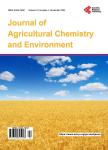Effects of Biochar on the Abundance of Three Agriculturally Important Soil Bacteria
Effects of Biochar on the Abundance of Three Agriculturally Important Soil Bacteria作者机构:Bangladesh-Australia Centre for Environmental Research (BACER-DU) Department of Soil Water and Environment University of Dhaka Dhaka Bangladesh Industrial Microbiology Laboratory Institute of Food Science and Technology (IFST) Bangladesh Council of Scientific and Industrial Research Dhaka Bangladesh
出 版 物:《Journal of Agricultural Chemistry and Environment》 (农业化学和环境(英文))
年 卷 期:2014年第3卷第2期
页 面:31-39页
学科分类:1002[医学-临床医学] 100214[医学-肿瘤学] 10[医学]
主 题:Biochar Bradyrhizobium Incubation Soil Health
摘 要:An in vitro study was conducted to make a comparative study of biochar and biomass on soil bacteria. The responses of three agriculturally important bacteria viz., Bradyrhizobium, Sulphate reducing and Iron oxidizing bacteria, were studied. Total viable counts were also made. Three different types of biomasses viz., rice husk, rice straw and saw dust, and biochars produced thereof were used for the study. The biomasses or biochars were applied to the soil at a rate of 5 t/ha. The study included seven different treatments of biomasses and corresponding biochars including a control. Total counts were made on the original materials as well as on the treated soils at 30, 60 and 90 days of incubation. Bacterial count was higher in all the biomass treated soils than the corresponding biochar treated ones including control. Although the presence of Bradyrhizobium, sulphate reducing and iron oxidizing bacteria were not noted in the fresh soils, their presence, however, was noted after incubation periods. The counts of all three bacteria are however lower in the biochar treated soils than the corresponding biomass treated soils. The paper discusses about the microbial soil health vis-à-vis biochar application, indicating that the materials exert negative effect on the soil microbial population and thereby likely to jeopardize soil health and crop production.



